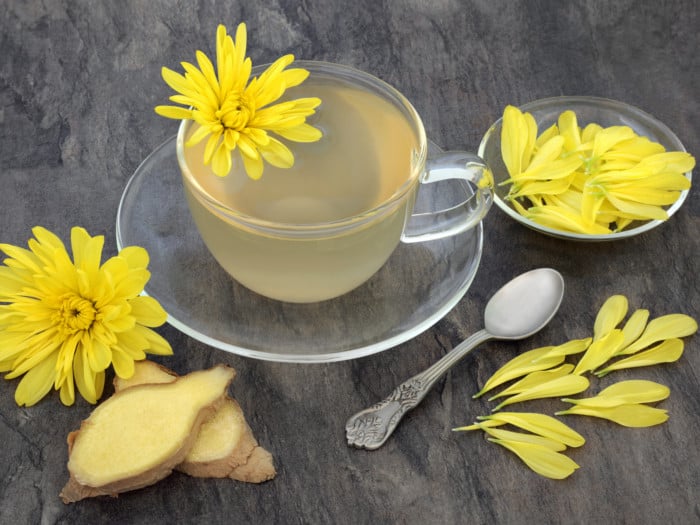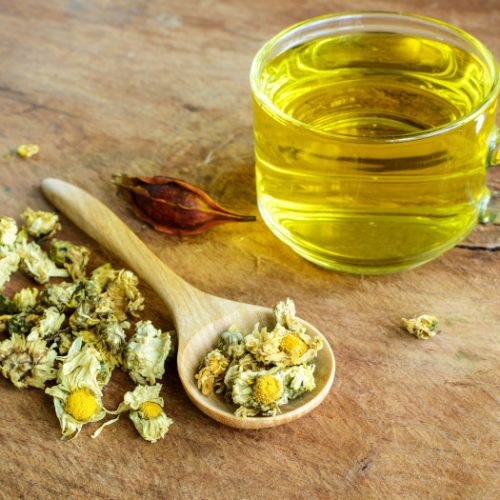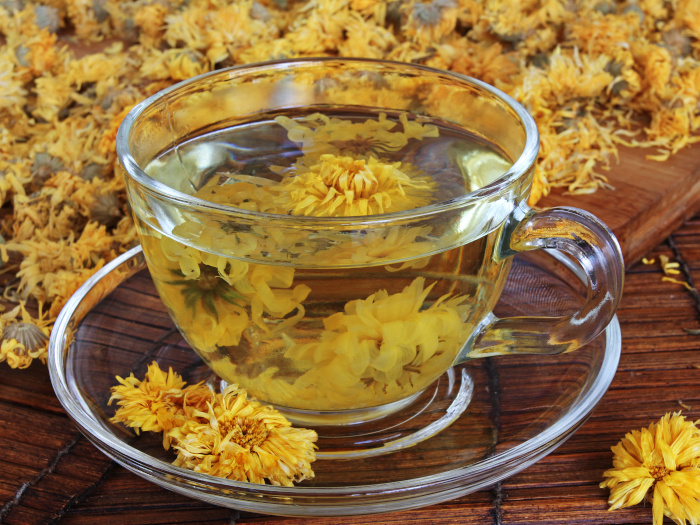A delicious and popular beverage, chrysanthemum tea may have several health benefits. Some of these may include its ability to protect your heart, boost your immune system, improve vision, calm your nerves, lower inflammation, strengthen your bones, and treat respiratory issues.
What is Chrysanthemum Tea?
Chrysanthemum tea is a refreshing beverage made from fresh chrysanthemum flowers. This tea has been around for more than a thousand years and originated in the Song Dynasty in China. The flowers used to make this strong tea comes in many varieties, but traditionally, the beneficial plant’s scientific name is Chrysanthemum Indicum. [1]
Unlike many other herbal teas, this tea is made by infusing hot water with full flowers. The infusion may release a wide variety of antioxidants, organic compounds, vitamins, minerals, amino acids, and soothing chemicals into the mixture, making for a delicious and highly nutritious drink!

Chrysanthemum tea is a flower-based infusion beverage that has a number of health benefits. Photo Credit: Shutterstock
The tea is traditionally made in China but is popular worldwide due to the floral scent, the flowers steeping, and occasional wolfberries or other herbs. There are four main varieties of this tea, prepared and consumed in China, from different species of this flowering plant. The tea’s color is pale to bright yellow, depending on its suitable strength and how long you’ve steeped the flowers. Its medicinal uses may have been known for centuries, making it highly sought after by natural healers. [2]
Chrysanthemum Tea Benefits
Let’s take a more in-depth look at some of the surprising health benefits of chrysanthemum tea.
May Act As Nerve Relaxant
To relax and unwind after a long day, chrysanthemum tea might be particularly suitable. This tea may help lower blood pressure, cool the body, reduce inflammation, and induce calmness. The powerful antioxidants and minerals may help your body regulate itself and eliminate unnecessary stress hormones in the blood. [3]
May Promote Heart Health
Studies show that chrysanthemum tea may reduce blood pressure and provide relief from coronary artery diseases. By lowering blood pressure and cholesterol levels, this tea may be a long-term preventative measure for cardiovascular issues, as well as atherosclerosis. [4] [5]
May Be A Potent Anti-inflammatory Agent
There may be a significant amount of beta-carotene in chrysanthemum tea, which might help break down into vitamin A. Vitamin A eliminates oxidative stress and damaged cells in organ systems around the body. According to a study in the Journal of Traditional and Complementary Medicine, chrysanthemum tea may clear up skin irritation, redness, and chronic conditions, such as eczema and psoriasis. As an anti-inflammatory agent, it might also help generally reduce the signs of aging, as well as wrinkles and blemishes. [6] [7]
May Boost Immune System
Vitamin A and C might be in high concentrations within chrysanthemum tea, and both of these vitamins are crucial for immune system health. Vitamin C may help stimulate the production of white blood cells and functions as an antioxidant to protect against free radicals. There might also be quite a few minerals in chrysanthemum, such as magnesium, calcium, and potassium, all of which are necessary for a healthy immune system. [8] [9]
May Improve Bone Health
The chrysanthemum extract may improve the conditions of bone mineral density loss, so start drinking this tea while you’re young, to ensure that you can be active and healthy when you’re old! [10]
May Increase Metabolism
There may be many different types of vitamin B in chrysanthemum, including folic acid, choline, niacin, and riboflavin. All of these are necessary for the normal functioning of the body. Moreover, these range from developmental progress and growth to hormonal levels. [11]
How to Make Chrysanthemum Tea?
This tea is super easy to make and requires less time.

Invigorating Chrysanthemum Tea Recipe
Ingredients
- 5 g chrysanthemum tea dried
- 3 cups of water
- sugar optional
Instructions
- Place the dried tea in a tea bag or a tea strainer of your preference.
- Boil 3 cups water and pour over the tea. Let it steep for about 3-5 minutes until it turns into a golden-yellow color.
- Add sugar or any other sweetener of your choice, if desired.

Notes
- Since the petals get in the way while drinking, it is best to tie up the tea in a cheesecloth, use a tea-strainer, or make in a teapot with a built-in strainer.
- You can add water to the tea for extra batches.
Word of Caution: Some people may experience allergic symptoms particularly if they are allergic to ragweed or daisies. The symptoms may be usually mild, ranging from a skin rash to itchy eyes or throat. So, avoid use if you have these allergies. Similarly, if you try to use concentrated chrysanthemum oil, proceed with caution, as the oil is highly concentrated.

